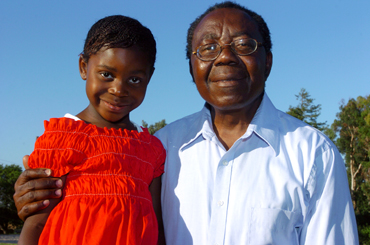
Liberian family settles in Morgan Hill after escaping war
There are dates people never forget. Wedding anniversaries.
Birthdays. But for John Siafa, the date he will never forget is
Dec. 24 1989
– the day a 14-year civil war started in his native Liberia.
Liberian family settles in Morgan Hill after escaping war
There are dates people never forget. Wedding anniversaries. Birthdays. But for John Siafa, the date he will never forget is Dec. 24 1989 – the day a 14-year civil war started in his native Liberia.
Siafa and his six-year-old daughter, Satta, are trying to find new dates to cement into their memories – like the date he and his daughter stepped from a plane at San Jose International Airport two years ago. Or June 22 – the day Satta graduated from kindergarten at the Little Sonshine School House in Morgan Hill.
Satta’s father smiled as he recalled how she hardly knew her ABCs last summer when she started classes at the preschool.
“There was never any time for that,” he said.
He spread his and his daughter’s government-issued I-94 cards – they were classified as indefinite refugees – social security cards and Satta’s permanent residency card on the table with pride as he shared the story of how he came to Morgan Hill.
Liberia – a country founded by descendants of freed American and Caribbean slaves – has had a long history of government instability and rebel fighting so when the war first broke out Siafa didn’t believe it would last long.
Siafa lived in Greenville, Liberia, where he taught mathematics and physics at a senior high school. His wife and three children lived in the capital, Monrovia, near the west coast of Africa.
“I left my wife and three children there,” he said. “I never saw them again.”
The school had been closed for a vacation when rebel forces marched in on July 27, 1990. One student lived in the interior of the country – in what Siafa calls the bush and they headed to his village. For five years, Siafa lived in the jungle.
“It was atrocious. They killed or dismembered innocent people,” Siafa said. “A civil war for power is one thing, but this …”
While the war was fought for power, many factions fought against each other and did not stop at killing other combatants, but killed civilians as well.
As many as 250,000 people were killed and thousands more displaced.
Eventually, Siafa made his way east to the Ivory Coast with other refugees.
“People [refugees] started coming across at one point, though it was not quite safe,” he said, since armed forces pursued civilians. “But we walked the distance knowing there was the United Nations commission on immigration.”
It had been 11 years since he heard from his family and there were no resources to make contact with them. He still doesn’t know if his wife or children are alive.
“We had no phones. We had no mail,” he said. “We are still hoping one day we might find them.”
While teaching in the Ivory Coast for the United Nations, Siafa settled down with a woman. Siafa’s daughter Satta was born in 2000. Two years later, her mother left.
“She went away with another man,” Siafa said, without a hint of bitterness. “That is how things are during war.”
The rebel fighting had spread to many of the surrounding countries including the Ivory Coast. With his two-year-old daughter, Siafa applied to immigrate to the United States since the United Nations offered a program that allowed refugees to go the U.S. As they waited for their application to be approved, Siafa and Satta lived in a refugee camp. In May 2004, they were accepted as indefinite refugees and headed around the world to San Jose.
“I fled so many times, I had nothing but the shirt on my back,” Siafa said. “I brought some books and cassettes in French for Satta so she will know the language of the Ivory Coast where she was born.”
Catholic Charities of Santa Clara County planned for Siafa and Satta’s arrival. While living in San Jose for a brief time, a neighbor invited Siafa to a Presbyterian church.
“I’m a Christian myself,” he said.
When he was moved to Morgan Hill, his former neighbors told him about the local Morgan Hill Presbyterian Church, which is home to the Little Sonshine School House. While he accepted a job at Home Depot, the teachers at his daughter’s preschool encouraged him to take the CBEST and CSET so that he could substitute teach at the local schools. He passed both tests and worked as a substitute in Morgan Hill and Gilroy.
“Coming here is a blessing,” Siafa said, who plans to work toward a teaching credential next. “We have met people of remarkable generosity. With teaching, I can give back to the community that has given us so much.”
Still he cannot forget the country and family he left behind. With an unofficial cease-fire in 2003 and a new leader who took over in 2005 – Ellen Johnson-Sirleaf – Siafa remained hopeful that stability might come to Liberia. But the country still has an 85 percent unemployment rate and nearly 80 percent of residents live below poverty.
“I am beginning to reflect,” Siafa said. “When you run away from your house burning, you just run away. But then the thoughts begin to come to you.”








